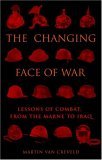

Eminent Dutch-Israeli military historian Martin van Creveld has the rare distinction among historians of having been more right about the future than he has been about the past. His earlier 1990’s works, The Transformation of War and The Rise and Decline of The State
and The Rise and Decline of The State were radical interpretations for military history and clashed somewhat with the views of Europeanist and late Medieval specialists but they pointed to the current state of global affairs with great prescience and scholarly authority.
were radical interpretations for military history and clashed somewhat with the views of Europeanist and late Medieval specialists but they pointed to the current state of global affairs with great prescience and scholarly authority.
Van Creveld’s latest book, The Changing Face of War: Lessons of Combat From the Marne to Iraq is not an example of a historian resting on his laurels but of expanding and extrapolating upon previous ideas. In this book, Dr. van Creveld analyzes the evolution of twentieth century warfare up to it’s WWII apex and subsequent decline to a 21st century nadir of shrunken conventional armies, overloaded with goldplated technology but unable to beat shadowy terrorist groups and ragtag insurgencies armed with homemade bombs.
is not an example of a historian resting on his laurels but of expanding and extrapolating upon previous ideas. In this book, Dr. van Creveld analyzes the evolution of twentieth century warfare up to it’s WWII apex and subsequent decline to a 21st century nadir of shrunken conventional armies, overloaded with goldplated technology but unable to beat shadowy terrorist groups and ragtag insurgencies armed with homemade bombs.
The perspective here is theoretical ( “trinitarian” vs. “non-trinitarian”), systemic and Germanocentric. Van Creveld clearly admires the technical and cognitive martial prowess of the Wehrmacht and the old Imperial German Army that stamped itself so heavily on the bloody history of the twentieth century. He clearly relates the connection between effective logistical coordination between a mass production, capitialist, industrial economy and the armies in the field, unlike most historians, accurately crediting the Kaiser’s Quartermaster-General, Erich Ludendorff ,for having had the breakthrough insights into the political economy of Total War.
The most interesting chapters are the last ( here I agree with William Lind) where Van Creveld takes premier military historian John Keegan to task and critiques the performance of American arms in Iraq. Van Creveld is returning the warm embrace that the Fourth Generation Warfare school has given his body of work in disputing Keegan’s contention that a Nazi-occupied Europe could not have been liberated by indigenous partisan forces. In my view, van Creveld is correct that the Manhattan Project would have rendered the whole question moot but is wrong in overestimating the ability of partisans to have overthrown Nazi domination.
Assuming the defeat of the USSR, Hitler would have simply liquidated the Serbian people as an example, incorporated the Scandinavian countries into a racial confederation system with Greater Germany, and been satisfied with a National Socialist “Findlandization” of the rest of Europe. Except for Russia, which Albert Speer indicated in his final book had been slated for depopulation and Slavic enslavement with no fewer than 30 million eliminated or worked to death building massive transnational autobahns. Preponderant force would have been used by the Nazis to quell open resistance to the ” New Order” but most European countries would have resembled Denmark or Vichy France, not Poland’s rump state “General Gouvernment”.
Van Creveld’s assessment of American performance in Iraq is bitterly harsh, bordering on vicious, but it is accompanied at the very end by a wise set of ” rules” for counterinsurgency warfare ( van Creveld advises throwing out the bulk of COIN literature as having been written by ” losers”) that merit widespread dissemination. One case study of successful counterinsurgency he points to favorably is the British experience in Northern Ireland where the use of military force was highly economized ( a case he omits, curiously, was El Salvador, where it was not), a general consideration for winning at the “moral level of warfare” when powerful state forces seek to defeat a “weak” opponent.
While The Changing Face of War is not the pathbreaking text that The Transformation of War represented, it is highly accessible to the layman, clearly written and coherently argued. It fits well on the shelf of any serious student of military history.
Links:
Cutting Edge Military Theory: A Primer (Part III.) – UPDATED
William Lind review at DNI
Fabius Maximus review at DNI
